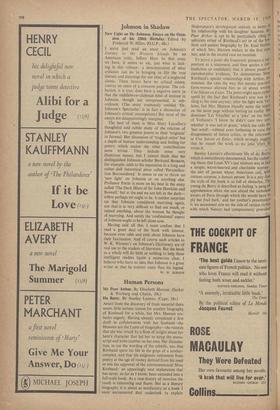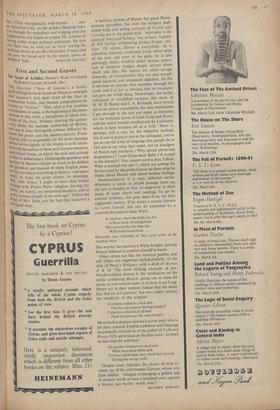Human Persons
Du Barry. By Stanley Loomis. (Cape, 28s.) APART from the discovery of fresh material there seems little serious reason for another biography of Rimbaud for a while, but Mrs. Hanson em- barks eagerly. Having already completed a first draft in collaboration with her husband—the Hansons are the Lunts of biography—she records that she was struck by a flash of insight about her hero's character that led her to scrap the manu- script and write another on her own. Her illumina- tion, to use the wording of the subtitle, was that Rimbaud spent his life in the grips of a mother= complex, and that his enigmatic retirement from poetry at the age of twenty derived from his need to win the approval of the commonsensical Mme Rimbaud : an appealingly neat explanation that has never, so far as I know, been extended into a full-scale book. As a case-history of momism the result is interesting and fluent. But as a literary biography it is about as satisfactory as a book I once encountered that undertook to explain
Shakespeare's development entirely in terms of his relationship with his daughter Susanna. MY Poor Arthur is apt to be particularly riling to admirers either of Rimbaud's art or of the brit' liant and patient biography by Dr. Enid Starkie, of which Mrs. Hanson makes, in the first case, hay, and in the second case no mention.
To prove a point she frequently presents a sup' position as a statement, and then quotes a con.
tradiction so confidently that it almost passes as
corroborative evidence. To demonstrate Mme Rimbaud's special relationship with Arthur, for, instance, she cites the way this sternly practical
farm-woman allowed him to sit about writing Une &Jinni en Euler. The point might seem rather
spoilt by the fact that Rimbaud's arm was in 3
sling at the time anyway, after his fight with Ver" laine, but Mrs. Hanson blandly notes the injury on the same page without batting an eyelid. She dismisses 'Les Voyelles' as a 'joke' on the basis of Verlaine's 'I know he didn't care two sour whether A was red or green,' which she calls the
'last word'—without even bothering to raise the disagreement of future critics, or the references in Une Saison en Enter, which strongly suggel that he meant the work as no joke NN hen ha wrote it.
Stanley Loomis's affectionate life of du Bar; y which is meticulously documented, has the ender
ing thesis that Louis XV's last mistress was in fad a simple, warm-hearted and charitable woman: the sort of person whom Americans call, With curious surprise, a human person. It is a pity that the style of the book is so full of obstacles. The young du Barry is described as feeling 'a pang of apprehension when she saw ahead the turbulent waters of Paris through which she would have to ply her frail bark,' and her mother's prostitution is 'an occasional sale on the side of certain riches with which Nature had conspicuously provided
her: ('This exceptionally well-written . . .' says an American critic on the jacket.) Hacking one's way through the metaphors and tripping over the euphemisms, one begins to suspect Mr. Loomis of `laving rather soupy political sentiments. He says Mat there was an 'avid joie de vivre' among the w°rking-classes in pre-Revolutionary France that can now be found only in the poorer towns of
Southern Italy. PENELOPE Gu..t.lArr



































 Previous page
Previous page